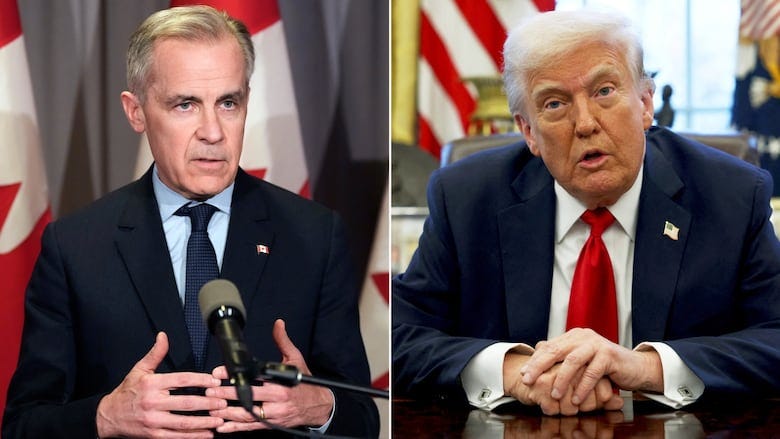Carney tightens borders but details are kind of Trump like
Yes, Canada should tighten up on immigration but that should mean banning MacDonald's and Tim's from bringing in foreign workers, not on making it more difficult to flee oppressive regimes.

In last week’s Throne Speech, the Carney government vowed that:
The government will set a limit on the number of temporary foreign workers and international students, establishing a cap starting in 2027 that will be below five percent of Canada’s population.
Yesterday, the government introduced legislation to tighten up on immigration but it had nothing to do temporary foreign workers or international students. That’s too bad because my guess is that there is widespread support for significant reductions in those areas, especially in the employer-driven Temporary Foreign Worker Program (TFWP). Instead, the government tightened up on those seeking asylum from oppressive regimes.
The 125-page, omnibus bill is complex with a number of disparate parts. Some of the provisions are supportable but on the immigration front, the changes are concerning. Here is what the bill calls for on refugees.
First, a foreign national would be ineligible to claim refugee status if they entered Canada after June 24, 2020, and make the claim more than one year after their day of entry. Under current Canadian immigration law, refugee claimants can apply for asylum as there is no strict time limit preventing individuals from making a refugee claim after their arrival.
The bill would also make foreign nationals who entered Canada along the Canada-US land border outside of an official customs station, permanently ineligible for claiming refugee status. Under current legislation, foreign nationals are eligible for claiming refugee status if they have crossed irregularly from the US, provided they make their claim at least 14 days after having entered Canada.
This is an odd opening gambit on the controversial immigration front. There was no mention of changing refugee rules in the Liberals detailed campaign platform and has elicited concerns from immigration lawyers. According to a quote in the Toronto Star by Queen’s University refugee law professor Sharry Aiken, “They’re coming up with all of these various ways to basically turn the tap off, to actually make it a more restrictive process,”
While there are real problems with the international student stream of Canada’s immigration system, the most problematic stream consists of those being brought in by employers under the Temporary Foreign Worker Program (TFWP). This program allows businesses to bring in workers from outside Canada to fill labor shortages when no qualified Canadians are available.
In 2021 and 2022, in response to employer pressure, the program was irresponsibly loosened up by the Trudeau government. Perhaps the most egregious aspect of this was to allow employers to hire up to 30% of their total workforce under the program’s low-wage stream which includes the giant accommodation and food services sector.
That’s right. MacDonald’s, Tim’s and Subway were allowed to bring in up to 30% of their total workforce under an officially sanctioned immigration stream!
And hire away they did. Reports indicate that the number of temporary foreign workers hired in accommodation and food services increased significantly in the 2021-2024 period compared to previous years. According to Statscan data, the number of temporary foreign workers approved to work in the that sector jumped 211 per cent between 2021 and 2024. Within this uptick, Tim Hortons hired roughly 714 temporary foreign workers in 2024 — a major increase compared to the 58 in 2021.
Some of these rules have been tightened up in the last nine months but there remains two fundamental problems with the program.
First, in the low-wage stream, the only reason employers have trouble recruiting is that they are unwilling to pay livable wages. There are no problems with seasonal work in fast food as there is in the agricultural sector and the eligibility of employers in accommodation and food services should be eliminated entirely.
Second, under the TFWP, most workers are tied to a single employer through a closed work permit. This means that they can only work for the employer who sponsored their permit. In turn, this results in a power imbalance where workers are vulnerable to exploitation because they depend entirely on one employer for their legal status and income.
The Liberal government was right to promise to reduce to reduce the number of TFWP workers in the Throne Speech which is why it was so disappointing that their first piece of immigration related legislation focused on making it harder to claim refugee status. In fact, when you zoom out from the particulars of the omnibus Bill 2, the whole thing reads as a response to the concerns of one only one man: Donald Trump.
A look at the three subheadings of yesterday’s government backgrounder on Bill 2 proves the point. They are: Securing the border, Combatting transnational organized crime and illegal fentanyl, and Disrupting illicit financing.
As I suggested in the beginning of the post, many of the specific provisions in the Strong Borders Act are supportable but taken as a whole, they have the feel of law making designed to pass the Donald Trump smell test.
I remain excited about future announcements of Canada’s first “nation building” projects, details on Build Canada Homes and the unveiling of other marquis planks in the Liberal policy agenda. I don’t even have a problem with the occasional bill that has snippets of things reflecting Trump’s concerns with Canada.
But that should wait until after Trump removes all the tariffs that he has unfairly imposed on this country, not on the same day he announced 50% tariffs on Canadian steel.
Donald Trump is unlikely ever be Canada’s friend but until those tariffs are removed we should refrain from making nice with him through legislation like the Canada Borders Act.



